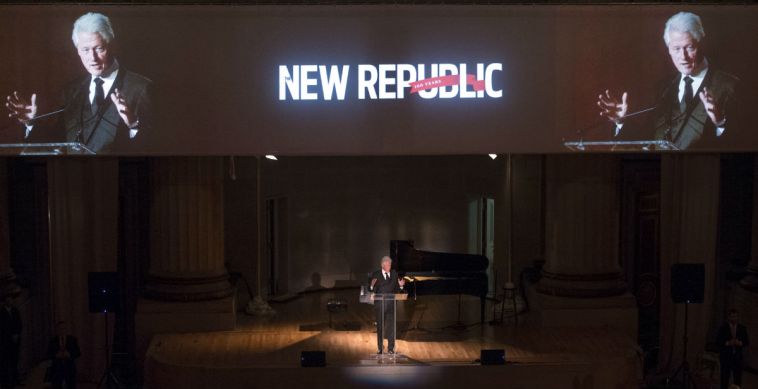While the rest of America was consumed last week with indignation over a the non-indictment of New York police officer Daniel Pantaleo for his now state-sanctioned killing of Eric Garner, the Beltway’s chattering classes were in a tizzy over a far different matter.
Videos By Rare
Their subject of concern wasn’t the nation’s history of racially tinged police violence, or the consequences of police militarization, or even how lax use of force laws and the war on drugs have allowed the worst cops on our streets to get away with, well, in some cases, murder.
No, their obsession du jour was the move by Facebook billionaire Chris Hughes to overhaul the New Republic, the century-old bellwether of center-left thinking that has largely been irrelevant since Bill Clinton’s second term in the White House.
Longtime writers for the New Republic, along with admirers among the center-right, caught the vapors after the 28-year-old Hughes – who bought the magazine from the notorious Martin Peretz two years ago – exercises his ownership privileges.
Hughes had been losing a reported $5 million a year on the New Republic. He decided to do something about that in part by pushing out its editor-in-chief, Franklin Foer, and Leon Wieseltier, whose spent more than three decades as the overlord of the magazine’s book reviews.
Shocked and appalled were so many of the magazine’s ink-stained wretches that nearly all of them – including contributing editors, such as New York’s Jonathan Chait and Ryan Lizza of the New Yorker – resigned within hours of Foer’s and Wieseltier’s departure.
The overwrought whining of Chait, Lizza and other former TNR staffers on Twitter and in print was matched by that among D.C.’s other glorified stenographers. Even the otherwise-sensible Ross Douthat, complained in the New York Times that Hughes was little more than one of the “blithe dot-com philistines” tearing down “institutions that once sustained a liberal humanism.”
From where they sit, the latest moves at TNR are destroying its precious DNA. This is untenable and unthinkable. No news outlet should ever change. Ever.
Except, history shows that this isn’t remotely true. No media outlet that has been around longer than a decade continues to exist without some major transitions.
Rupert Murdoch’s boisterously tabloid New York Post of today doesn’t even resemble the liberal broadsheet Wall Street heiress Dorothy Schiff lorded over for nearly 40 years, much less the Federalist Party-defending newspaper Founding Father Alexander Hamilton started 213 years ago.
The Wall Street Journal didn’t become the chief rival of the New York Times until 1941, when the legendary Bernard Kilgore took over as its managing editor. Meanwhile the Atlantic Monthly, has gone from being a literary magazine whose writers included Harriett Beecher Stowe and Mark Twain, to the publisher of such treatises from Martin Luther King and Vannevar Bush, to the left-leaning lifestyle monthly it is now.
The New Republic itself has had sweeping changes in its editorial direction. As Eric Alterman noted in an unusually-enlightening commentary in the American Prospect, staffers fled TNR soon after Peretz bought the magazine and fired then-editor-in-chief Gilbert Harrison.
Peretz began transforming it from a dowager of Walter Lippmann-styled liberalism to the bastion of Zionism, occasionally-contrarian center-left thinking, and entertainer of center-right polemicism that has made it dear to the hearts of Beltway journalists.
Given the magazine’s history, there is little wrong with Hughes’s decision to take The New Republic in a new direction. If anything, it probably should have happened sooner.
These days, TNR finds itself an also-ran in a media landscape that features such left-leaning online outlets as Slate (which now occupies the role of contrarian liberal thinking it once occupied), Ezra Klein’s harder-edged Vox, and the amusing-if-occasionally insightful BuzzFeed. All three churn out both the kind of long-form journalism for which the New Republic was long-renowned and the short pieces that garner the eyeballs much-prized by today’s advertisers.
The New Republic also lags behind the establishment-oriented outlets prized by Beltway centrists of all stripes. The Atlantic has long ago taken over TNR’s place as the vanguard for center-left commentary, while National Review occupies that position on the right. The New York Times has used its heft as one of the nation’s most-read newspapers to be a go-to for Beltway denizens in need of milquetoast thinking. There’s also Washington Monthly, New Yorker, even National Affairs.
Meanwhile The New Republic has to deal with the sins of shoddy journalism for which it must still atone. This doesn’t include charges by progressives that it was never left enough – or that it tolerated disgraced writers such as Stephen Glass and Ruth Shalit.
From Peretz’s shamelessly racialist columns about Black Americans and Arabs to its unquestioned cheerleading of former vice president Al Gore’s presidential ambitions to its egging on of the nation’s misadventures in the Middle East to Andrew Sullivan’s entire tenure as editor, TNR has published as much questionable commentary as it has good.
This isn’t to say that Hughes’ plans for TNR will work out. The ham-fisted way he dismissed of the bizarrely-beloved Foer makes it difficult for his replacement to attract new hires to the magazine.
But it is well past time for the New Republic to change. And Hughes’s transition could be for the better.

